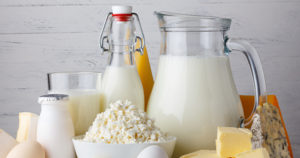Dairy foods such as milk, yogurt and cheese provide several important nutrients in the diet and are the richest dietary sources of calcium. The nutrients supplied by dairy foods help ensure normal body functioning and also help lower the risk of developing a variety of health problems. Because these nutrients are available from other sources, however, it is not necessary to get them from dairy foods
Types:
The types of dairy foods that make important nutritional contributions to the diet include milk, flavored milks, yogurt, frozen yogurt, ice cream, puddings made with milk, hard cheeses such as cheddar and swiss, soft cheese such as cottage cheese and ricotta and processed cheese, such as American.
According to the U.S. Department of Agriculture, fat-free or low-fat dairy products are the best choice for most people because whole-milk and whole-milk products add calories and fat to the diet. Although flavored milks such as chocolate and strawberry contribute the same nutrients to the diet as plain milk, they also add extra calories from sugar.
Nutrition
Dairy foods provide several important nutrients, including protein, B vitamins and vitamin D, and are considered major sources of calcium in the diet. For vegetarians who consume milk and other dairy products, dairy is a good source of high-quality protein and B vitamins otherwise found in meat and other animal products. Since milk is often fortified with vitamin D, which occurs naturally in some fatty fish but not in many other foods, dairy is a good source of this nutrient for everyone.
Significance
Many, both children and adults, do not get nearly the amount of calcium they need every day from their diets, according to the National Institutes of Health. The daily recommendations for calcium established by the government’s Food and Nutrition Board are 1,300 mg for males and females 14 to 18 years old, 1,000 mg for adults ages 19 to 50 and 1,200 for adults over the age of 50. Milk and other dairy products are major dietary sources of calcium when compared to other foods. For instance, low-fat yogurt supplies about 415 mg in an 8-oz. cup, 1.5 oz. of cheddar cheese supplies 306 mg. and reduced-fat milk provides 297 mg.
Dairy is an especially good source of vitamin D for those who don’t spend a lot of time in the sun, because exposure to UV light from the sun stimulates the body to make its own vitamin D. According to National Institutes of Health, this is how most people get their vitamin D.
Benefits
Eating several servings of dairy foods throughout each day can help prevent calcium deficiency. Over the course of a lifetime, calcium deficiency can lead to the breakdown and loss of bone tissue and increase the risk of developing the bone-thinning disease osteoporosis later in life. The calcium in dairy foods not only helps prevent bone loss, but may also reduce the risk of developing high blood pressure and colon cancer, according to Harvard School of Public Health.
Misconceptions
Although dairy is a valuable and convenient source of calcium and other nutrients, it is not the only dietary source of these nutrients and it is not necessary to get them from dairy foods. Legumes, leafy green vegetables such as kale and collard greens and canned fish with softened bones, such as canned salmon, also contain calcium. Salmon and mackerel are two types of fish that are high in vitamin D. In addition to meat, poultry, fish and eggs legumes, soy products, whole grains and other plant foods are good sources of protein. Calcium, vitamin D and B vitamins are also available in supplement form for those who cannot get enough of these nutrients in other ways.





































